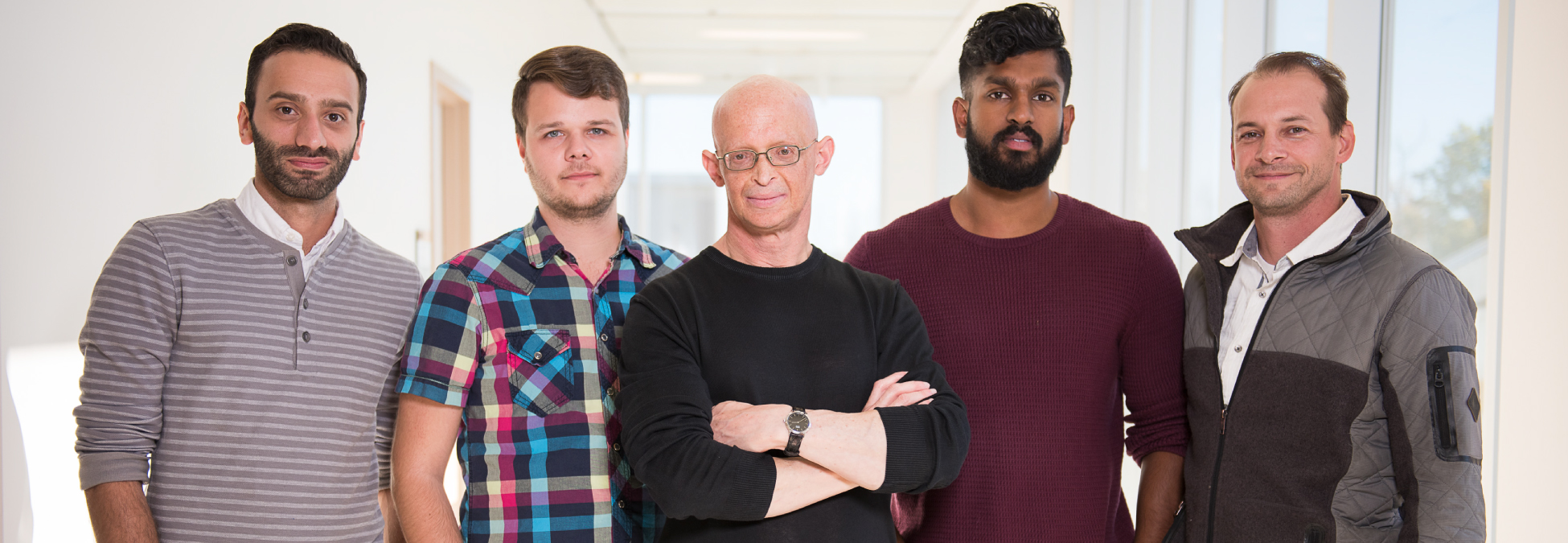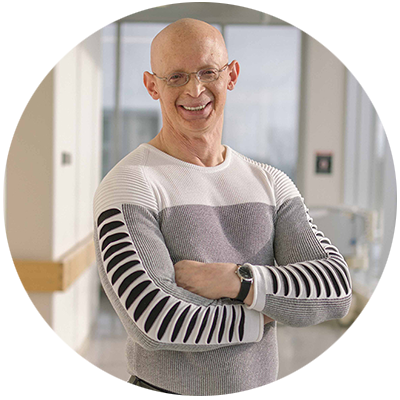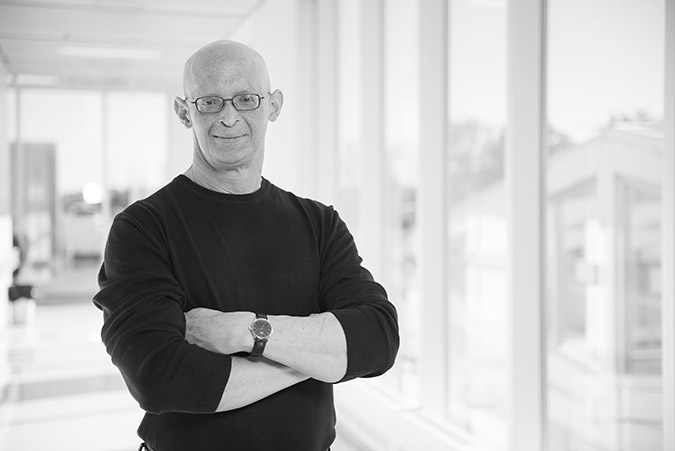
Encyclopedias, an eclectic education, and a lot of care
Meet Dr. Paul MacPherson, the first Clinical Research Chair in Gay Men’s Health at The Ottawa Hospital and the University of Ottawa

Dr. Paul MacPherson is recentring the “care” in healthcare for gay men in Ottawa every day through his practice-changing work. As a clinician scientist at The Ottawa Hospital, Dr. MacPherson balances research and clinical work to make sure gay men receive the best care possible. Now, after two decades working in infectious diseases, with a focus on HIV and other sexually transmitted infections, Dr. MacPherson is taking gay men’s healthcare in new directions as the first Clinical Research Chair in Gay Men’s Health at The Ottawa Hospital and the University of Ottawa.
Read on to learn about Dr. MacPherson’s favourite hobby as a kid and what motivated him to go to medical school in the ’90s.
Q: Can you tell us a little about your background and early years?
A: I grew up in New Brunswick, and though I’ve lived more than half my life outside the Maritimes, I still identify strongly as a Maritimer.
Growing up, I was definitely a geek. My favourite thing to do on a Saturday morning was read the encyclopedia. I know that sounds pathetic, but I really did love reading all the biological things. I was very good in school, and the only thing I didn’t like was math.
Q: How did you decide to pursue the sciences and medicine?
A: When I started university, I enrolled in a Bachelor of Arts, taking psychology, biology, classical Greek studies, English literature, and French. I liked that one hour I was in the biology lab and the next hour I was reading ancient Greek literature.
In my second year, some people slapped me across the head and told me I needed to get some focus. They said, “there’s no jobs for people in classical Greek studies and biology!” So, I switched into a Bachelor of Science in biology. I was offered graduate positions in physics, chemistry, math, French, and biology. There was no way it was going to be math or physics, so I went to the University of California at Berkeley to do my PhD in molecular biology. There, I studied the papilloma virus and the proteins that were involved in replicating the virus.
After a post-doc in neuroscience, I started a second post-doc in HIV in Ottawa. We’re talking early ’90s, at the real peak of the AIDS crisis, and a couple things coalesced for me: I came out and accepted that I am gay, and I realized I was actually a virologist. I saw gay men all around me suffering; they were not being treated in a way that would make you feel good. There was a lot of stigma, and let’s just say it was not a very happy time.
"I wanted to roll up my sleeves and wade into the muck and help."
Dr. Paul MacPherson
I went to medical school specifically to be involved in HIV medicine and HIV care — I wanted to roll up my sleeves and wade into the muck and help. I wanted to make sure gay guys were treated appropriately and with respect — not blamed for acquiring a viral infection.
Q: How have things changed since you first started working in HIV and gay men’s health in the early ’90s?
A: Things have changed enormously, certainly from a medical perspective. When I first got involved and went to med school, HIV was something people eventually died from. We were really trying to mitigate opportunistic infections and make the passage from health to illness to death as comfortable as possible, as people progressed eventually to AIDS.
HIV treatment now is generally one pill, once a day. Now, we even have injectable medications. The legacy of horrible side effects is gone. From a medical perspective, it’s really easy. It’s effective. People with HIV really can live out a normal life. Today, most of my HIV clinics are very social, asking patients: “How’s it going? How’s your life? Where did you go for vacation?” If you’d told me in the mid-’90s it would be like this today, I’d have been overjoyed, and I’d have found it hard to believe.
So yes, things are very good from a medical perspective. But, there’s still a lot of stigma and discrimination. People living with HIV still live with a heavy burden. We still have a lot of work to do and a long way to go there. I only wish we had come as far in that arena as we have with treatment.
Q: Why did you choose to work at The Ottawa Hospital?
A: The opportunity to do basic science research, which I did for 15 years, brought me to Ottawa. As I grew personally and delivered HIV care, I became more focused on that delivery of care, and I kept seeing that lack of a holistic view. Being gay was all about HIV, either having it or avoiding it, but being gay is really about being a person. We need medicine to see us entirely — as physical, mental, sexual, and social beings. So, I gradually moved away from basic sciences into what I do now: a focus on clinical care delivery. The thing about The Ottawa Hospital is, they let me do that. When I said, “I want to do more of this,” they said, “Fine, good on you.” No one said I couldn’t, and that’s unique in employment. They let me grow personally and professionally, and that provides motivation and allows for new ideas to come forward.

Q: What is The Ottawa Hospital currently doing for gay men’s health?
A: We’re working towards better, relevant healthcare delivery for gay guys. We’re not there yet, but we’re working towards it and committed to it.
Currently, we’re developing a guide on primary care for gay guys that can be used by healthcare providers. If we want change, we need to stimulate and support that change. The other big thing is our website — HUGO, or Health Unlimited for Guys in Ontario. We have health information for gay guys and four learning modules for care providers on HUGO.
When we created HUGO, I thought the hospital would want nothing to do with it; there’s a lot of stuff about sex in it and sexual health. I thought they were going to slam the door in my face, but they didn’t. I asked, “Who actually looked at the website? Did you see some of the words in there?” I mean, the website uses common language and vernacular. We don’t talk about sex clinically. But, when I asked if they had actually seen it, they said, “Yep, we did.” I thought, “Man, that’s impressive.”
Kudos to The Ottawa Hospital for doing this. Not everyone’s going to step up, but they did it.
Q: How did this role come about?
A: It came from a community focus group discussion where we were talking about the barriers gay guys face in healthcare. One of the community members said, “Since there’s so much work to be done, why isn’t there a research chair in this area?” Initially, I didn’t think the hospital or university would support one. But this guy brought the idea forward to the Foundation and The Ottawa Hospital’s Research Institute, and there was immediate interest.
The purpose of the chair is to take a really broad, inclusive view of gay men’s health through education, clinical programs, and research so we can address their physical, mental, social, and yes sexual, wellbeing.
A big thing to emphasize is that gay men’s health isn’t just about HIV or sexual health. We need to be seen as full individuals.
Q: What do you hope to accomplish as the Chair in Gay Men’s Health?
A: What I’m really hoping is that this is just the beginning, the groundwork, as we make healthcare more relevant for gay guys.
Mental health is a huge issue. The prevalence of depression and anxiety in gay men sits in the mid to high teens, with anxiety higher in younger guys. Our data show 25% of guys find sex stressful.
We’re also looking at seniors in the community. Alcohol use is much higher in older gay men than younger men. We’ve found about 40% of senior gay guys live alone, and 45% don’t live in the downtown core. You can see there’s a population that’s living alone, outside the core, with heavy alcohol use, that’s not connected to sexual health services. Our concern is, based on their life experience from decades ago, maybe they don’t feel welcome in medicine. We need to find these guys and make sure they know they’re welcome — and bring them into gay-informed care.
"I also hope this will serve as a model for other minority health groups facing healthcare barriers: lesbians, transgender people, refugees, street-involved people etc."
Dr. Paul MacPherson
It’ll be a two-pronged approach: education and programming, and also reaching out to the gay population to make sure they know we’re working on this.
I also hope this will serve as a model for other minority health groups facing healthcare barriers: lesbians, transgender people, refugees, street-involved people etc.
Q: What would we find you up to when you’re not in the clinic or lab?
A: Like every other person, when I’m not at work, I’m at home doing housework! But two things I really like are languages and travel. I had a goal as a kid to speak seven languages. I fell far short of that and haven’t even mastered English yet, but I still enjoy languages. I’ve been very fortunate in traveling very broadly — highlights were Bhutan and Russia — and I consider myself blessed for all the different cultures and people I’ve been able to visit.
The Clinical Research Chair in Gay Men’s Health is funded through the generous support of the Department of Medicine and community support through The Ottawa Hospital Foundation. The Ottawa Hospital’s Research Institute and the University of Ottawa helped make the Chair a reality through the Faculty of Medicine’s Clinical Research Chair program. Read more about Dr. MacPherson and what his vital new role will mean for patients.

